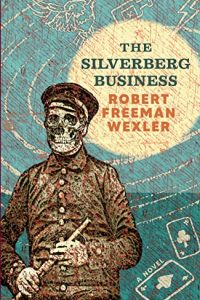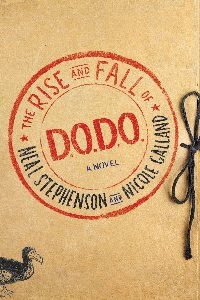The Great When by Alan Moore: Review by Gary K. Wolfe
 The Great When, Alan Moore (Bloomsbury 978-1-63557-884-3, $29.99, 336pp, hc) October 2024.
The Great When, Alan Moore (Bloomsbury 978-1-63557-884-3, $29.99, 336pp, hc) October 2024.
By now there are so many mystical-magical ‘‘hidden London’’ novels that it’s getting hard to keep up – though admittedly there’s something delicious about the notion that in any great city, you’re only being shown what they want you to see, with the real city available only at certain access points for certain chosen adventurers. In his acknowledgments to The Great When, the first volume of a projected five-novel series called Long London, Alan Moore singles out only Michael Moorcock and Iain Sinclair among antecedents, but there’s little doubt that he’s broadly acquainted with the conventions of the form and fully prepared to place his distinctive if at times familiar stamp on it. As an artist named Spare explains to Moore’s young protagonist about Long London (or the Great When), ‘‘that world, it’s realer than the one we’re in. Our world’s just a shadow next to that, up on the wall of Plato’s cave. If this London is what they call the Smoke, that place is the Fire, you follow me? This ’ere is echo, and that there is music.’’ As if to underline this stylistically, Moore’s narrative shifts into an exuberant, all-italic present tense when we’re in his phantasmagorical version of Long London, and the flood of surreal and expressionist imagery is as intimidating to us as it is to his characters.
But as much fun as Moore seems to be having in constructing his Platonic dream inferno, what actually grounds the novel is the more mundane setting of London in 1949, still rebuilding from the Blitz, with fragments of its ancient heritage uncovered by the bombings – as if to remind us there really is a hidden city. The wonderfully named Dennis Knuckleyard, barely 18, works and lives in a run-down bookshop run by the crusty and profane Coffin Ada, easily the book’s most colorful figure, as well as its most unpleasant. When Ada sends Dennis off to purchase a number of Arthur Machen books, he discovers that among them is a book that only existed in a couple of Machen stories, and shouldn’t be in the real world at all. This is his first clue that the other London exists, and Ada insists the book must be returned there lest they all face a gruesome fate. This sets in motion Dennis’s central quest, in which he finds himself pursued by a nasty gangster named Jack Spot, falls in love with the young prostitute Grace, and meets characters both historical, like Machen’s publisher John Galsworthy, and magical, like a terrifying figure called Charming Peter and an unexpected ally named Gog Blincoe, a giant who seems to be a cross between a Hulk and an Ent. Among other secondary figures are Dennis’s endlessly cheerful pal Clive, a handsome and successful lawyer who gets much more interesting later in the novel.
While the novel takes an odd twist in its final third, with one central plot line giving way to an entirely different one, it’s a wildly kinetic and entertaining adventure for most of its length, as well as a kind of postwar coming-of-age tale for its young protagonist and his spirited companion Grace. Grace herself is almost a too-familiar figure, a tough-as-nails hooker with a heart of gold who dreams of becoming a dancer, but it’s also a little unfortunate that the only two major women in the novel – Grace and the terrifying Ada – veer close to being archetypes. Readers might also be cautioned that a somewhat lengthy prologue, called ‘‘The Music at the Beginning’’, apparently meant to be a kind of overture (complete with orchestrations like woodwind, brass, or strings), is less inviting, with its murky introductions of figures whose significance only becomes apparent much later. Once you get to Chapter One, however, the plot takes off with admirable verve and some intriguing literary mysteries, leaving plenty of room for subsequent adventures in later volumes.
Interested in this title? Your purchase through the links below brings us a small amount of affiliate income and helps us keep doing all the reviews you love to read!


Gary K. Wolfe is Emeritus Professor of Humanities at Roosevelt University and a reviewer for Locus magazine since 1991. His reviews have been collected in Soundings (BSFA Award 2006; Hugo nominee), Bearings (Hugo nominee 2011), and Sightings (2011), and his Evaporating Genres: Essays on Fantastic Literature (Wesleyan) received the Locus Award in 2012. Earlier books include The Known and the Unknown: The Iconography of Science Fiction (Eaton Award, 1981), Harlan Ellison: The Edge of Forever (with Ellen Weil, 2002), and David Lindsay (1982). For the Library of America, he edited American Science Fiction: Nine Classic Novels of the 1950s in 2012, and a similar set for the 1960s. He has received the Pilgrim Award from the Science Fiction Research Association, the Distinguished Scholarship Award from the International Association for the Fantastic in the Arts, and a Special World Fantasy Award for criticism. His 24-lecture series How Great Science Fiction Works appeared from The Great Courses in 2016. He has received six Hugo nominations, two for his reviews collections and four for The Coode Street Podcast, which he has co-hosted with Jonathan Strahan for more than 300 episodes. He lives in Chicago.
This review and more like it in the September 2024 issue of Locus.
 While you are here, please take a moment to support Locus with a one-time or recurring donation. We rely on reader donations to keep the magazine and site going, and would like to keep the site paywall free, but WE NEED YOUR FINANCIAL SUPPORT to continue quality coverage of the science fiction and fantasy field.
While you are here, please take a moment to support Locus with a one-time or recurring donation. We rely on reader donations to keep the magazine and site going, and would like to keep the site paywall free, but WE NEED YOUR FINANCIAL SUPPORT to continue quality coverage of the science fiction and fantasy field.
©Locus Magazine. Copyrighted material may not be republished without permission of LSFF.







